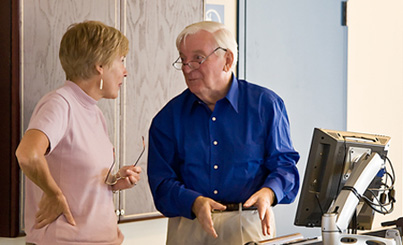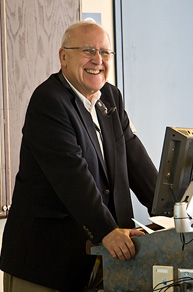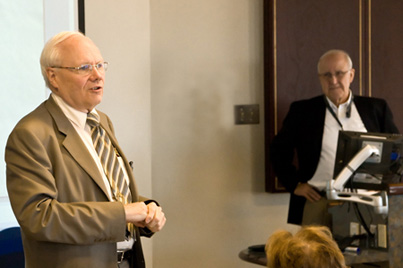Learning has no age limits: MILR opens educational doors to seniors
Learning has no age limits: MILR opens educational doors to seniors McGill University
User Tools (skip):
Learning has no age limits: MILR opens educational doors to seniors

MILR moderators Liz Parish and Rory O’Sullivan talk about the use of audio visual and electronic equipment in study groups.
Gordon Campey
Toss out the word "retirement" and most 9-to-5ers will drool like Pavlov's dog as they dream of leisurely days reading books and taking long walks on Mount Royal.
But the reality is that many people find the so-called Golden Years a challenging time of transition.
"The first year or so, you do nothing – which is great. But then you start missing something and you don't quite know what it is," said Gordon Campey from the offices of McGill's Institute for Learning in Retirement (MILR). "What you're missing, of course, is being with people, sharing your life with them and learning from them."

George Latimer leads a discussion on Spanish history.
Gordon Campey
Campey, a retired marketing professional, is a quintessential MILRer who both takes classes at the Institute and moderates them. "Although we don't call them classes," said Carolynn Rafman, the MILR's program coordinator. "They're study groups."
While it may sound like splitting hairs, the difference is the very cornerstone of the MILR philosophy and framework that eschews the formal sit-and-listen lecture format for a more lively forum that thrives on debate and a vigorous exchange of ideas. Enrolment numbers speak eloquently of the MILR's success. Nineteen years ago, the Institute first opened its doors to about 150 participants. This past fall the numbers topped 800.
Each semester, the Institute offers upwards of 50 such study groups, in both English and French, ranging in subject matter from the Chinese and Japanese art, voice and spirit of tea to understanding and applying the concept of reasonable accommodation. While the moderators choose the global topic, set reading lists and sometimes suggest possible discussion threads, the focus of the five- to 10-week sessions is dictated by participants at the very first meeting. Each participant chooses a sub-topic and prepares a 20-30 minute presentation for classmates. Two such presentations are given each class, followed by an open discussion period for the rest of the two-hour session.
"We're promoting self-directed study and peer learning," said Rafman.

Glenn Cartwright discusses parental alienation syndrome.
Gordon Campey
Stirring it up
The format, based on a model developed at Harvard, differs from that of the Université du troisième âge program developed at the Université de Sherbrooke and offered throughout the province. In the Sherbrooke model, qualified experts conduct traditional lectures.
"Our groups are more suited for people who don't want to sit back and listen," said Campey. "I guess we're more inclined to voice our opinions and stir things up."
Interestingly, unlike their Sherbrooke counterparts, MILR's moderators often have no expertise on their subject of choice. "Sometimes moderators design a study group based on a topic they want to learn more about," explained Campey. "While they create the outline, they are also engaged in the learning process."
One of the by-products of MILR's organic educational philosophy, in which participants are both teachers and students, is a curriculum that is sustainable and ever-changing. MILR members in one study group often take a new slant on the topic to create an entirely new class, a phenomenon Rafman calls "maintaining momentum." As a result, each semester sees new study groups replacing some that have run their course.
Another thing that sets the MILR apart is the interplay between generations. Unlike a typical university class in which the vast majority of students are of a similar age, MILR members can range from people in their early 50s to their mid-90s. "One member, who is in her 90s, always says, 'What are you doing here, Gordon? You're too young,'" Campey said with a laugh.
Good-natured rookie jokes aside, the significance of the MILR's elder statesmen and women is not lost on the "junior" members.
"I was in one study group on museums – which can be a pretty dry subject," Campey said. "And one woman talked about the Anne Frank Museum. But rather than spend a lot of time talking about the museum itself, she talked about what she felt when she walked through the museum and what it was like being a Jewish child in Europe during World War II. "You can't pick that up on the Internet, in books or films or even in regular university classes. Just talking about it gives me goosebumps."
For more information, go to www.mcgill.ca/milr.

